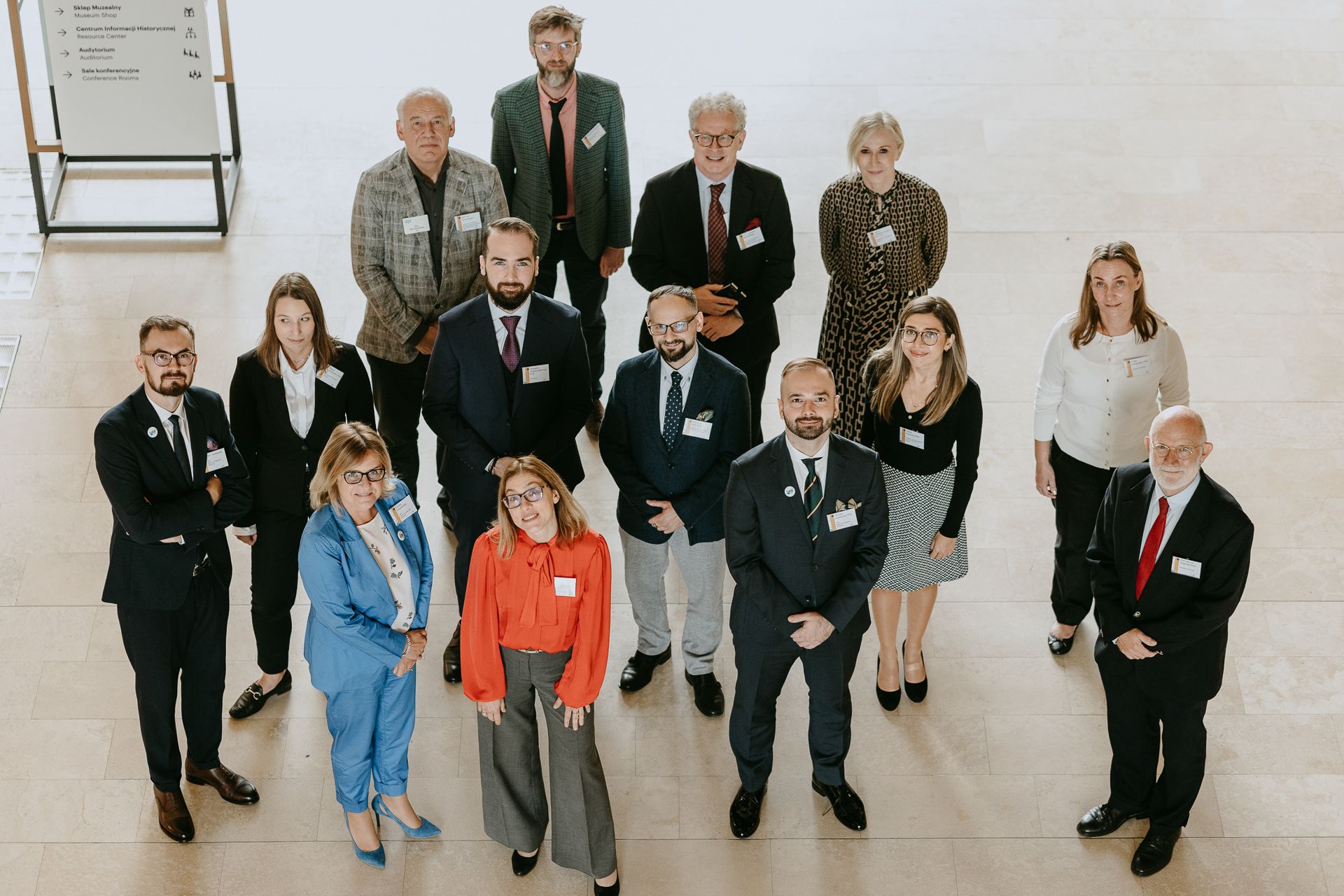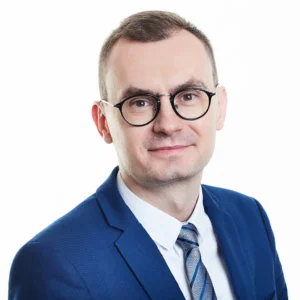The first international scientific and business conference on the subject of unitary patent system and Unified Patent Court organized in Poland was a fascinating meeting of prominent theoreticians and practitioners of intellectual property law. The exchange of opinions, experiences and different points of view confirmed our conviction that a discussion in which a wide range of experts are engaged always leads to the most interesting conclusions.
At the beginning, the group of distinguished speakers and guests present in POLIN Museum, as well as the exceptionally large number of online conference participants were welcomed by Dorota Rzążewska, the Managing Partner at JWP Patent Attorneys. During her opening speech she underlined that for over 30 years JWP law firm has actively participated in shaping the market of intellectual property protection services in Poland. Indeed, in 2022 we celebrate the anniversaries of JWP Patent and Trademark Attorneys and JWP Foundation.
The next speakers were Tomasz Gawliczek, PhD, attorney at law and patent attorney, and Piotr Godlewski, Polish and European patent attorney, Partner in JWP Patent Attorneys, who both were moderators and co-organizers of the conference. The first speaker made it clear in his speech that this event was intended not only to share the knowledge on the new patent protection system, but also to engage as many interested people as possible in discussion about it. In turn, in a second presentation, it was underlined that the discussion in this regard shall take place both on scientific and on business levels. The moderators introduced participants of two panels that constituted the core of conference.
The scientific part of the conference, chaired by Tomasz Gawliczek, PhD, consisted of lectures given by prominent patent law experts from across Europe and their joint debate. The first speech of Tamar Khuchua, PhD, focused on the process of creating unitary patent protection system and allowed to recognize a chronological order of events that have led to present moment. The second speaker, professor Manuel Desantes Real, explained to conference participants why he remains sceptical about the new system. However, at the end of this panel – already during the discussion – he admitted that notwithstanding many shortcomings, the unitary patent system is better than the one being currently in place. The next lecture was given by professor Laurent Manderieux who presented arguments for Poland’s accession to the Agreement on a Unified Patent Court (in short and long term perspective). The representatives of Saint-Louis University in Brussels and Catholic University in Louvain, Luc Desaunettes and professor Alain Strowel presented in turn some alternatives to the system provided by the UPCA. In this context, they referred to protection system of European Union trademarks and designs which is already in place.
After the first break the floor was taken by Leythem Wall who discussed the role and responsibilities of the European patent attorneys before Unified Patent Court. As a practitioner he drew the attention of participants to these EU patent package regulations that concern the issue of representation of the parties to future proceedings. Later, the participants could hear the answer to one of the key questions related to implementation of new patent protection system, i.e.: will this system be beneficial for small and medium enterprises? Krista Rantasaari, PhD, who analysed this problem in her doctoral thesis, shared her considerations on the subject. Subsequently, numerous doubts were raised and discussed concerning the possibility of granting unitary SPC which shall also come under Unified Patent Court jurisdiction. The possible scenarios related to this issue were discussed by Justyna Ożegalska-Trybalska, PhD. At the end of the second part of scientific panel we had an opportunity to listen to the presentation of Bart van Wezenbeek who, as a representative of EPI, pointed out what else needs to be done in order to be well prepared for implementation of the new system. Referring to the question asked in the conference title: Ready or not?, he answered somehow playfully: get ready!.
In the last part of scientific panel the floor was taken by Luke McDonagh, PhD, Pieter Callens and Tomasz Gawliczek, PhD. The first presentation focused on problems arising during current patent disputes in Europe which could be solved by creating Unified Patent Court. The following lecture concerned the issue of exclusion of European patents from the UPC jurisdiction. Pieter Calens indicated what shall be anticipated while taking a decision in this regard. The last presentation within scientific panel was given by Tomasz Gawliczek, PhD, and it concerned the issue of Poland’s accession to the unitary patent protection system. Tomasz Gawliczek, PhD, reminded the arguments present in public debate in 2012-2013 and then he presented facts and assumptions that should be taken into account while considering the accession of Poland to the UPC system. He also presented the relevant statistics and comparisons to other European Union countries.
The scientific panel ended with experts discussion during which they were asked by the moderator about the particular issues raised in their presentations. At the end of discussion each expert was asked whether he or she supports the creation of the unitary patent protection system and what advice he or she would give to Poland in relation to possible accession to the new system. All speakers concluded that notwithstanding shortcomings of the system which had been mentioned by them before, the participation in it and co-creation thereof may be in the end more beneficial than only observing it from a distance.
The second part of the meeting was chaired by Piotr Godlewski. The representatives of many different market sectors as well as scientific and research institutions were among the invited guests what allowed to present the problem from many different perspectives. Since 75% of all entities filing applications in European Patent Office are universities or public institutions, and only 25% are from private sector, among experts who referred to practical (business) scope of the new system the following ones had to be present: Zuzanna Kowalkiewicz, PhD, who represented the Łukasiewicz Research Network; Krzysztof Maternicki from the Polish Association of Centers for Technology Transfer (PACTT), and Tomasz Poczęsny, who represented the biggest technical university in Poland – Warsaw University of Technology. The position of companies was presented by Justyna Rechnio, the Polish and European patent attorney, who leads the team of patent experts in pharmaceutical company Polpharma S.A., and Grzegorz Wesela-Bauman, PhD, the Polish and European patent attorney, who represented the GE Power company. Agata Sobol, the attorney in Franzosi Dal Negro Setti law firm from Milan, presented the Italian perspective of perceiving this new system. Quite unequivocal position of all foreign guests could (and probably would to some extent) influence the hypothesis presented during this part of the conference. Referring to the new system and specifically the lack of possibility to exclude particular states within time specified by the entitled person, Zuzanna Kowalkiewicz correctly concluded – what was confirmed by the following participants – that it is indeed a quid pro quo. In the opinion of present guests, a new regulation which – contrary to the one being in place to date – results in a necessity to maintain unitary patent in all markets, simultaneously constitutes the price that must be paid for cheaper (unitary) model of patent protection. Tomasz Poczęsny stated that final decisions concerning the procedure chosen and the relevant strategy shall remain with businesses and not with scientists who deliver new solutions. Justyna Rechnio drew the attention of participants that pharmaceutical industry, on behalf of which she intervened, was, is and will be present in Poland, notwithstanding the existing forms of protection, and at the same time she referred to a specificity of this industry and a necessity to take into account the interests of other market participants while taking such a crucial decision. Grzegorz Wesela-Bauman indicated that in such a big enterprise as GE the patent portfolio had already been analysed and he pointed out that in his opinion first disputes which will take place before the Unified Patent Court shall certainly be very costly. Attorney Agata Sobol presented Italian perspective and concerns which were recognized among patent attorneys in this country and she also explained that within time these concerns transformed into a general acceptance of the system. Referring to necessary training related to new regulations we talked with Krzysztof Maternicki who admitted that acquiring additional knowledge by the employees of technology transfer centres is of crucial importance in the whole process.
Piotr Godlewski who moderated this part of the meeting dedicated considerable time to the issues concerning knowledge and indicated how important it is to educate all the stakeholders which may influence the functioning of new system, either in theoretical or practical way, because only a thorough knowledge shall enable to meet the possible concerns and to reply to questions that arise.
At the end of the business panel – before the discussion with all participants of the conference begun – Piotr Godlewski underlined that with this event JWP law firm opens further debate in Poland concerning the new system which shall enter into force in the year 2023. While not taking any sides, the JWP law firm has made an effort to organize such an event to enable a presentation of different points of view and perspectives and to provide a prospect for upcoming weeks, months or years during which it shall be jointly decided – considering the interests of all interested stakeholders – whether Poland will be a part of the unitary (EU) patent protection.
The system of unitary patent protection and Unified Patent Court will soon become a reality. In 2023 we will already be able to share first experiences related to its functioning. Certainly, another discussions, analysis and debates are ahead of us since we have to seek an understanding and to ensure optimal solutions by working jointly with scientists, experts, business people and politicians.

We are pleased that we could start such a discussion in Poland because, although our country do not participate in unitary patent protection system, Polish entities will have the possibility to apply for protection of their inventions in this system and they will participate in disputes before the Unified Patent Court. Therefore, it is important to be ready for upcoming change and to participate actively in a discussion on shaping the unitary patent protection system.
Once again we thank our distinguished guests very much for truly interesting debate and our partners for their support. We are happy that there was such a great interest in the conference. Thank you for participation! Soon we will present further information and conference materials. We invite you to follow and to join the discussion #dyskusjaUPC.
We also encourage you to find out more about unitary patent protection and the Unified Patent Court and to contact our experts:
 piotr.godlewski@jwp.pl
piotr.godlewski@jwp.pl 


